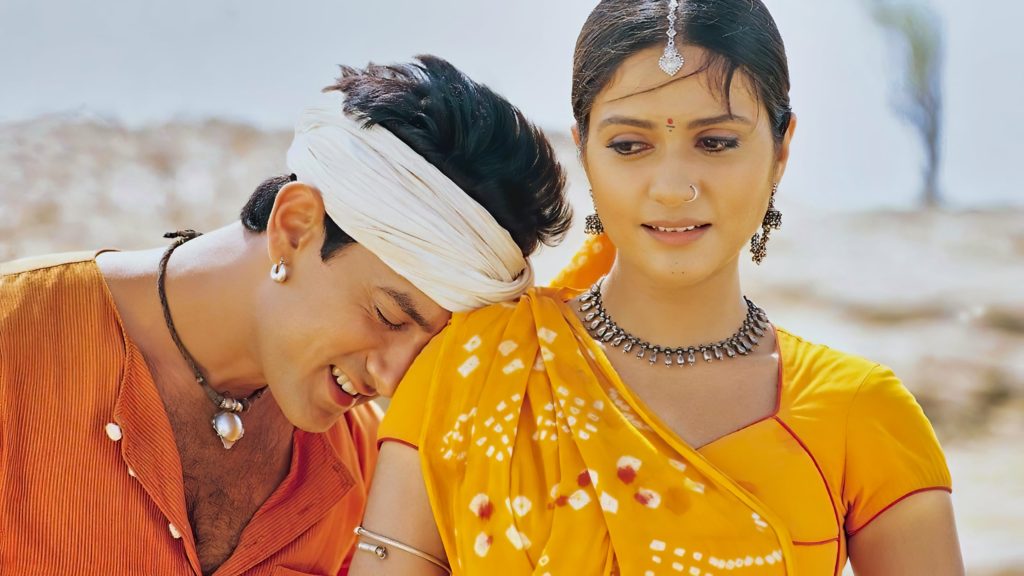
If you only watch one interfaith, underdog-sports musical in your life, let it be Lagaan. An Academy Award nominee for Best International Feature Film in 2002, Lagaan provides a gratifying viewing experience for seasoned fans of Bollywood musicals as well as those new to the genre.
One cannot help but be immediately swept up into the world of the film thanks to acclaimed composer A.R. Rahman’s phenomenal score and Aamir Khan’s charismatic lead performance as Bhuvan, the devout Hindu farmer whose faith compels him to believe he can win against the oppressive forces of empire.
Set in 1893 during the height of the British Raj, the film concerns the plight of the farmers of a drought-stricken Indian village called Champaner. They are asked to pay a double tax (lagaan) to their Raja at the behest of Captain Andrew Russell, the unscrupulous leader of the local British garrison (played with preening evil panache by Paul Blackthorne). Facing certain starvation, the desperate villagers seek an audience with the Raja to beg for mercy but are forced to wait until he is finished attending a cricket match organized by British officers. The forlorn villagers watch the game with equal parts bewilderment and frustration as the colonial agents responsible for their present hardship engage in what appears to be a version of their childhood game Gilli-Danda. When one of the villagers is assaulted by a British officer for daring to touch an errant ball, pure-hearted farmer Bhuvan leaps to his neighbor’s defense and pushes the officer to the ground. This altercation draws the attention of both Captain Russell and the Raja. Bhuvan tells the Raja that the villagers came to see him and not the foreigners’ “stupid game.” Russell takes umbrage at this statement, but his wrath is seemingly cut short by the Raja entreating him to forgive the disgruntled villagers. When the match finishes, the Raja tells the farmers that he cannot do anything to reduce their tax burden. All seems lost when Russell appears and says that he is more than willing to cancel the tax. There is only one little condition – the villagers must defeat the local garrison in a game of cricket in three months’ time. Should the villagers lose, they will be forced to pay triple the tax. Both Russell & the villagers know that this wager is anything but sporting, the latter having no equipment or knowledge of the game’s rules. Yet, Bhuvan agrees to the deal over the protestations of the others. Thus, a narrative is set in motion that is as much about the sustaining power of faith as it is about poor Indian villagers learning to master the rules of cricket.
At its heart, Lagaan is a musical that celebrates the role religious faith plays in fostering hope amongst oppressed peoples. Village life in Champaner centers around the veneration of the Hindu god Krishna. Most of the film’s significant scenes take place within the local temple or its immediate vicinity. This devotion is particularly significant as Krishna is not just any deity but the eighth incarnation of the god Vishnu, the protector of the universe and one charged with restoring the balance of good and evil in troubled times. A truly pious man, Bhuvan never falters in his conviction that Krishna will recognize the righteousness of their cause and help them best the foreigners at their own game. Encountering obstacle after obstacle, he entreats the farmers to “have faith” and not give in to fear. Bhuvan reminds his teammates that anyone “who has faith & courage in his heart, shall win in the end.” Taking these words to heart, the villagers find themselves able to face significant setbacks with the humility of souls who know that their lives are not their own. It is this shared faith that sustains the farmers of Champaner in hardship and ultimately empowers them to offer a spirited opposition to their sporting British overlords.
Prisca Bird (2022)
- Directed by: Ashutosh Gowariker
- Produced by: Reena Dutta; Aamir Khan
- Written by: Ashutosh Gowariker; Kumar Dave/ Sanjay Dayma
- Music by: A. R. Rahman
- Cinematography by: Anil Mehta
- Editing by: Ballu Salujah
- Release date: 2001
- Running time: 164 minutes
- Language: Hindi; English
Arts & Faith Lists
2022 Top 25 Movie Musicals — #22